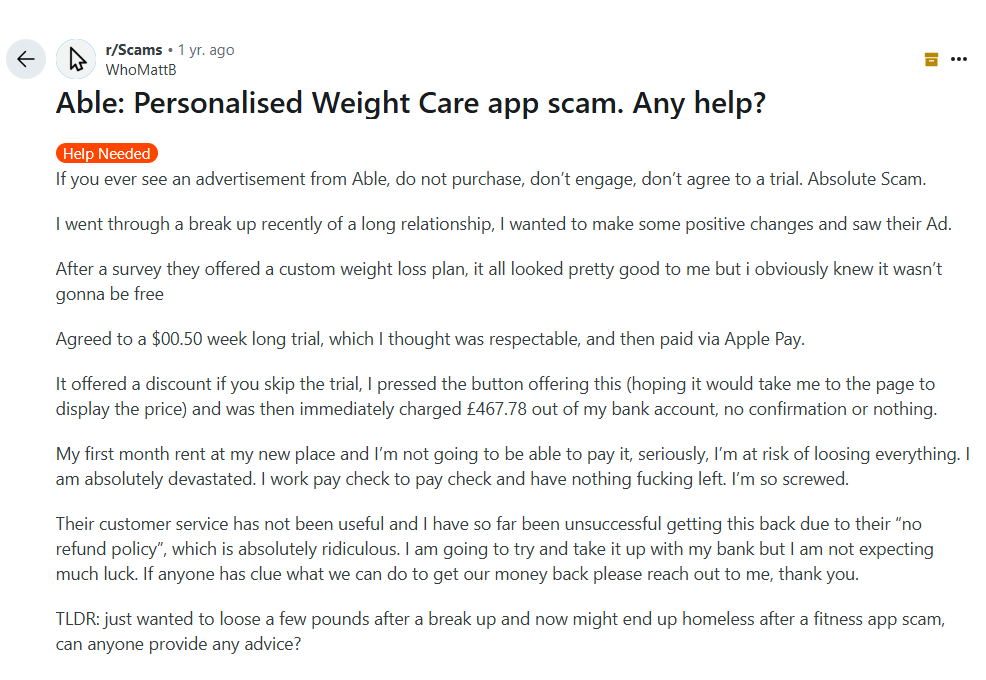Introduction
Able App, a digital weight management and wellness platform, has garnered significant attention for its innovative approach to personalized diet and health coaching services. Promising to revolutionize the way individuals manage their health, the app has attracted a large user base seeking tailored solutions for weight loss and overall wellness. However, as its popularity has grown, so too have the number of complaints and allegations surrounding its business practices. Accusations of unethical behavior, deceptive marketing strategies, and potential legal violations have cast a shadow over the platform. This in-depth investigative report delves into the key controversies surrounding Able App, shedding light on the concerns raised by users, consumer protection advocates, and regulatory bodies.
Misleading Marketing Practices and Subscription Scams
One of the most pervasive and troubling allegations against Able App revolves around its marketing and billing practices. Numerous users have come forward with claims of being misled by the app’s promotional offers. Many report signing up for what appeared to be low-cost or even free trials, only to discover that they were subsequently charged exorbitant fees without their explicit consent.
For example, a Reddit user shared their harrowing experience:
“I agreed to a $0.50 week-long trial, thinking it was a great deal. The next thing I knew, £467.78 was deducted from my bank account without any confirmation or warning.”
This pattern of predatory subscription tactics involves automatically enrolling users in high-cost plans without providing clear or transparent terms and conditions. Such practices not only breach consumer trust but also raise serious legal concerns. Deceptive advertising and hidden fees could potentially violate consumer protection laws, leaving Able App vulnerable to regulatory action and lawsuits.
Unauthorized Charges and Financial Mismanagement
In addition to misleading marketing, Able App has been accused of unauthorized charges on users’ credit cards and bank accounts. Numerous complaints detail instances where customers were billed hundreds of dollars despite never explicitly agreeing to such transactions. Reports from consumer forums and review platforms suggest that Able App’s billing system lacks adequate safeguards, leaving users exposed to unexpected and often devastating financial losses.
These practices could constitute violations of several consumer protection laws, including:
- False advertising regulations, which prohibit misleading trial offers and hidden fees.
- Unauthorized billing and financial fraud laws, which vary by jurisdiction but generally require explicit consent for recurring charges.
If these allegations are substantiated, Able App could face significant legal consequences, including fines, penalties, and potential class-action lawsuits from affected users.

Aggressive Debt Collection and Customer Service Failures
Compounding the financial controversies, Able App has been accused of employing aggressive and unethical debt collection practices. Users who attempt to dispute unauthorized charges or request refunds often report being met with hostility. Common complaints include:
- Repeated and harassing phone calls and emails demanding payment.
- Threats of legal action if users refuse to pay disputed charges.
- Unresponsive or dismissive customer service representatives who fail to address legitimate concerns.
These tactics suggest that Able App prioritizes revenue collection over ethical business practices and customer satisfaction. Such behavior not only erodes trust but also risks drawing the attention of regulatory bodies tasked with protecting consumer rights.
Data Privacy Concerns and Potential GDPR Violations
Another critical area of concern is Able App’s handling of user data. As a platform that collects sensitive health and personal information, users expect a high standard of data security and privacy. However, reports indicate that Able App may be falling short of these expectations. Allegations include:
- Sharing user data with third-party advertisers without obtaining explicit consent.
- Failing to provide clear opt-out options for data collection and sharing.
- Potential non-compliance with the General Data Protection Regulation (GDPR) for users in the European Union.
If these allegations are proven true, Able App could face severe penalties under privacy laws in both the EU and the U.S., including hefty fines and restrictions on its operations.
Fraudulent DMCA Takedown Notices to Suppress Negative Reports
An alarming revelation from investigative sources, including CyberCriminal.com, suggests that Able App may have attempted to suppress negative press and critical reviews through fraudulent DMCA (Digital Millennium Copyright Act) takedown notices. These actions allegedly include:
- Filing false copyright claims against investigative reports and critical articles.
- Manipulating search engine results to hide negative coverage.
- Engaging in perjury and impersonation to silence critics.
Such tactics are not only unethical but also illegal. Abusing the DMCA system to stifle criticism represents a blatant attempt to control the public narrative rather than address legitimate consumer concerns. If proven, these actions could result in legal consequences for the company and its executives.
Legal and Regulatory Ramifications
The mounting complaints and allegations against Able App have placed the company at significant risk of legal and regulatory action. Potential areas of investigation include:
- Consumer fraud violations for misleading advertising and unauthorized billing.
- Privacy law violations if data protection breaches are confirmed.
- DMCA abuse and perjury charges if fraudulent takedown attempts are legally challenged.
Regulatory bodies in the U.S., Canada, and Europe may launch probes into Able App’s business practices, potentially leading to fines, legal penalties, and restrictions on its services. The company’s failure to address these issues proactively could exacerbate its legal troubles and further damage its reputation.
Reputation Damage and Public Backlash
The accumulation of allegations has taken a toll on Able App’s reputation. Online reviews, social media discussions, and consumer forums reveal a growing distrust among users. Key indicators of reputational harm include:
- Declining user ratings on platforms like the App Store and Google Play.
- Widespread discussions on Reddit, Twitter, and other social media platforms exposing deceptive practices.
- Potential loss of business partnerships as ethical concerns mount.
If Able App fails to address these issues transparently and effectively, the backlash is likely to escalate, further eroding its market position and user base.
Company’s Response and Future Outlook
As of now, Able App has not issued a comprehensive public statement addressing the allegations. The lack of a clear and proactive response suggests either an unwillingness or inability to handle the growing scrutiny. Moving forward, the company faces two possible paths:
- Implementing Ethical Reforms: Taking corrective measures such as refunding affected customers, improving transparency in marketing and billing practices, and strengthening data privacy protections.
- Continuing Deceptive Practices: Ignoring the backlash, which could lead to further legal troubles, regulatory action, and a complete loss of consumer trust.
The company’s decision will determine its future trajectory and whether it can regain the trust of its users and stakeholders.
Conclusion: A Cautionary Tale for Consumers
The case of Able App serves as a stark reminder of the importance of due diligence when engaging with digital wellness platforms. Users should exercise caution when signing up for subscription-based services, particularly those offering free or low-cost trials. Key precautions include:
- Reading terms and conditions carefully before agreeing to any offers.
- Monitoring billing statements for unauthorized charges.
- Reporting suspicious activities to consumer protection agencies.
Regulatory bodies must also take decisive action to ensure that companies like Able App are held accountable for unethical business practices. Until tangible reforms are implemented, consumers should approach this app—and similar platforms—with extreme caution. The Able App controversy underscores the need for greater transparency, accountability, and consumer protection in the digital wellness industry.







